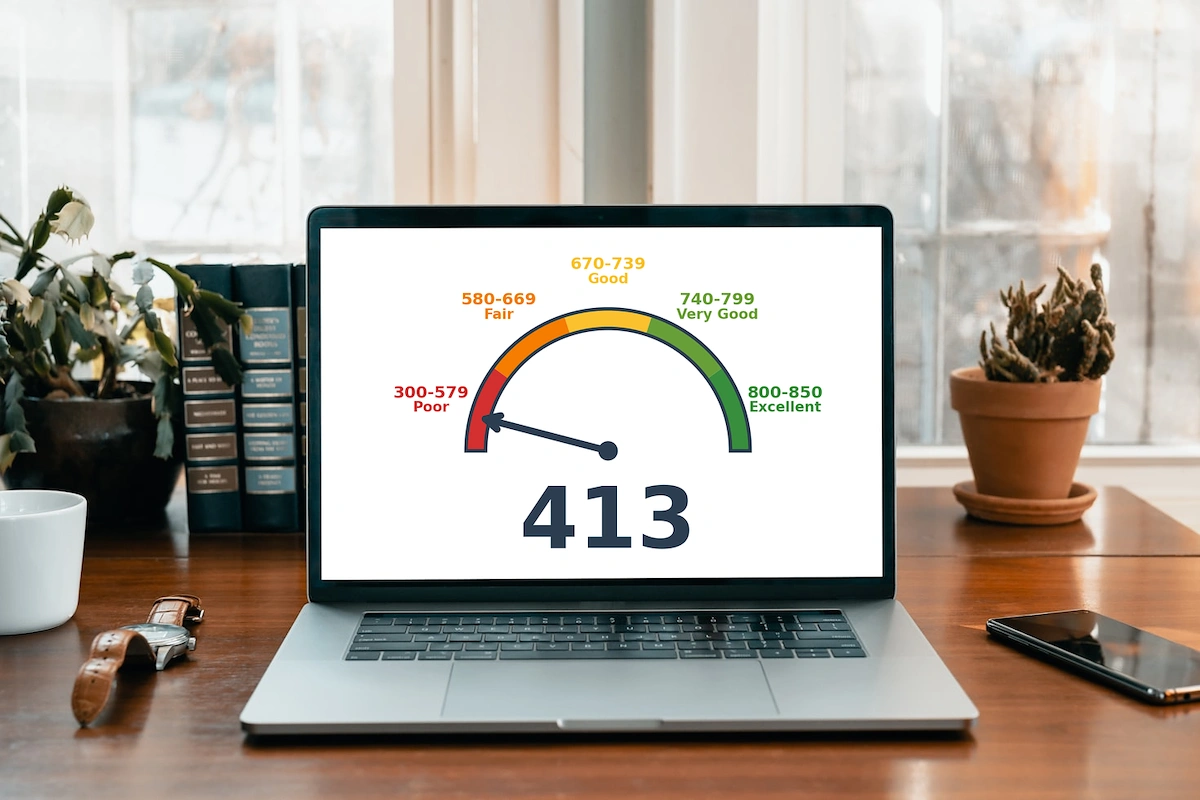
Kudos has partnered with CardRatings and Red Ventures for our coverage of credit card products. Kudos, CardRatings, and Red Ventures may receive a commission from card issuers. Kudos may receive commission from card issuers. Some of the card offers that appear on Kudos are from advertisers and may impact how and where card products appear on the site. Kudos tries to include as many card companies and offers as we are aware of, including offers from issuers that don't pay us, but we may not cover all card companies or all available card offers. You don't have to use our links, but we're grateful when you do!
413 Credit score: What You Need to Know in 2026
July 1, 2025


TL;DR
While a 413 credit score indicates there are opportunities for improvement, it provides a clear starting point for building a stronger financial profile. This score falls into the "Poor" category on the FICO scale, which means there is significant potential for positive growth.
What Does a 413 Credit Score Mean?
A credit score of 413 places you in the "poor" category of the FICO Score range, which spans from 300 to 850. Lenders consider scores in this bracket to be a sign of very high risk, often stemming from a history of significant financial difficulties. This score suggests to potential creditors that you have had serious trouble managing financial obligations in the past.
Financially, a 413 score can be quite restrictive. You'll likely find it difficult to get approved for new loans or credit cards. Any credit offers you do receive will probably have very high interest rates and unfavorable terms, making borrowing expensive. While this presents a significant challenge, understanding where you stand is the first step toward improving your financial outlook.
Who Has a 413 Credit Score?
While age isn't a direct factor in calculating your credit score, there is a clear trend of scores increasing over time. According to 2023 Experian data, average credit scores vary significantly across different generations:
- Generation Z (ages 18-26): 680
- Millennials (ages 27-42): 690
- Generation X (ages 43-58): 709
- Baby Boomers (ages 59-77): 745
- The Silent Generation (ages 78+): 760
Credit Cards With a 413 Credit Score
A credit score of 413 falls into the "very poor" range, which unfortunately signals to lenders that you are a high-risk borrower. Consequently, your chances of being approved for most traditional credit cards are quite low, as issuers will be hesitant to extend credit. The options available to you will likely be limited to secured credit cards that require a cash deposit or certain unsecured cards specifically designed for rebuilding credit, which often come with high fees and interest rates.
To find the best options for your situation, a tool like Kudos can be invaluable; its AI-powered Explore Tool uses a quiz to understand your financial preferences and goals. Based on your answers, the tool provides tailored recommendations from its database of nearly 3,000 cards, transparently showing how each option matches your stated needs.
Auto Loans and a 413 Credit Score
A 413 credit score places you in the deep subprime category, which can make securing an auto loan challenging. Lenders view this score as high-risk, often resulting in significantly higher interest rates and stricter loan terms.
According to a 2025 analysis, average auto loan rates vary significantly based on credit score for both new and used vehicles:
- Super-prime (781-850): 5.25% for new cars / 7.13% for used cars
- Prime (661-780): 6.87% for new cars / 9.36% for used cars
- Non-prime (601-660): 9.83% for new cars / 13.92% for used cars
- Subprime (501-600): 13.18% for new cars / 18.86% for used cars
- Deep subprime (300-500): 15.77% for new cars / 21.55% for used cars
Mortgages at a 413 Credit Score
With a 413 credit score, qualifying for a standard mortgage is highly unlikely. Most lenders have minimum score requirements that are significantly higher; even lenient FHA loans require at least a 500 score with a 10% down payment. According to a 2025 mortgage guide, very few borrowers with scores below 600 successfully obtain a mortgage. Your options would likely be limited to alternative financing, such as rent-to-own, which carries considerable risks.
If you were to find a specialty lender willing to offer a loan, the terms would be extremely unfavorable. You would face very high interest rates, a large down payment requirement, and higher fees. Lenders would also cap the amount you could borrow and subject your entire financial profile to a strict review process called manual underwriting. This combination of factors makes borrowing prohibitively expensive and difficult to secure.
What's in a Credit Score?
Figuring out what goes into your credit score can feel like trying to solve a complex puzzle, but it generally boils down to a handful of key elements. The most common factors include:
- Your payment history, which tracks whether you pay your bills on time, is the most significant factor.
- Credit utilization, or the amount of credit you're using compared to your total available credit, also plays a major role.
- The length of your credit history demonstrates your experience with managing credit over time.
- Having a healthy mix of different types of credit, such as credit cards and installment loans, can positively impact your score.
- Finally, recent credit inquiries, which occur when you apply for new credit, are also taken into account.
How to Improve Your 413 Credit Score
While a 413 credit score can feel discouraging, it's entirely possible to rebuild your financial standing with consistent effort and the right strategy. There are several proven methods you can use to start improving your score today.
- Apply for a secured credit card. This type of card is accessible for those with damaged credit because it requires a security deposit, which reduces the lender's risk. Responsible use is reported to the major credit bureaus, helping you establish a positive payment history from the ground up.
- Become an authorized user. By being added to a trusted person's well-managed credit card, their positive payment history and low credit utilization can be added to your credit file. This can provide a significant boost, especially for those with a limited or damaged credit history.
- Establish automatic bill payments. Since payment history is the single most important factor in your credit score, setting up automatic payments ensures you never miss a due date. This simple action prevents further damage to your score and starts building a crucial track record of reliability.
- Address collection accounts. Negative marks from collections can severely drag down your score, so it's important to address them directly. You can often negotiate a settlement or a "pay-for-delete" agreement to have the negative item removed from your report entirely.
Using a financial companion like Kudos can help you manage your cards and monitor your score as you work to improve it.
Unlock your extra benefits when you become a Kudos member

Turn your online shopping into even more rewards

Join over 400,000 members simplifying their finances

Editorial Disclosure: Opinions expressed here are those of Kudos alone, not those of any bank, credit card issuer, hotel, airline, or other entity. This content has not been reviewed, approved or otherwise endorsed by any of the entities included within the post.



































.webp)







